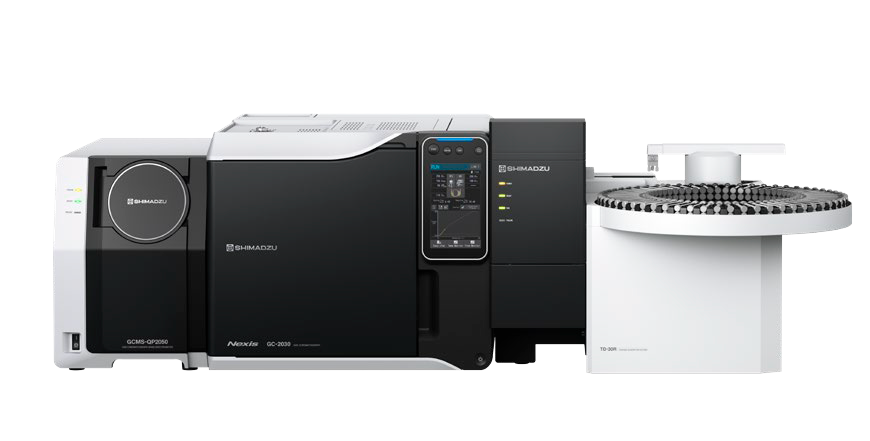- The GCMS-QP2050 features a new interface that enables good peak shape and sensitivity even when analyzing compounds with high boiling points.
- When used with the TD-30R thermal desorption system, it can analyze compounds in accordancewith VDA 278.
- The TVOC Calculation Tool can calculate in a simple manner quantitative emissions (toluene and hexadecane equivalents) in accordance with VDA 278..

Fig. 1 GCMS-QP™2050, Nexis™ GC2030, and TD-30R
In recent years, measures to reduce the use of organic compounds in automotive interiors have progressed, the VDA 278 standard was developed in Germany for the analysis of volatile organic compounds (VOCs) and semi-volatile organic compounds (SVOCs) that are emitted from automotive interior materials. The VDA 278 analytical procedure involves filling a thermal desorption (TD) glass tube with a sample of materials, heating the tube using TD, and loading the VOCs (up to C25) and SVOCs (C14 to C32) that were emitted from the sample into a GC-MS system for analysis. Although this standardized procedure enables simple and quick analysis of VOC and SVOC emissions from these materials, contamination of the MS system caused by the simultaneous loading of compounds with high boiling points is a problem.
As shown in Fig. 1, the GCMS-QP2050 is equipped with a new contamination-resistant ion optical system that effectively minimizes contamination of the MS. Featuring a new interface that enables good peak shape and sensitivity even for compounds that are typically prone to adsorption, it is optimally suited to analyzing SVOCs, including those with high boiling points.
This edition of Application News describes analyzing VOC and SVOC emissions from the materials of vehicle interiors in compliance with VDA 278 using the GCMS-QP2050 together with the Nexis™ GC-2030 and the TD-30R thermal desorption system.





